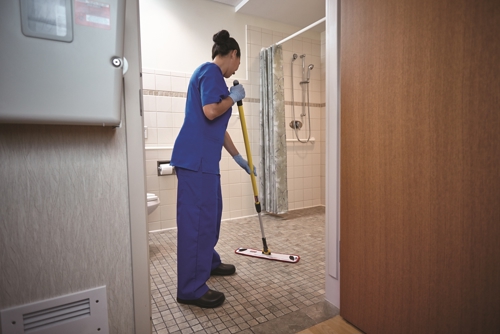
The need to keep aged care facilities clean and sanitised is more important than ever. An outbreak in a senior living centre or nursing home can wreak havoc on a vulnerable population, and once a contagious infection has taken hold in such a facility, it can be extremely difficult to stop. Cleaning in aged care facilities requires thoroughly trained staff and the right cleaning supplies for use in what is ultimately a healthcare facility.
A commercial cleaning staff member may not be trained in all of the processes required to keep an aged care facility properly sanitised. They may also not be equipped with the right tools for the job. When hiring employees who will be responsible for cleaning, or considering outsourcing, make sure those in charge of cleaning and sanitising understand the risks improperly cleaned surfaces pose to residents.
By following best cleaning practices, the likelihood of illness and infection in aged-care facilities can be reduced. This stands as the first line of defence to mitigate the risk of spreading infection and a widespread healthcare crisis, and can also help keep staff healthy and able to provide care to those in their charge. Rubbermaid healthcare cleaning solutions can help.
Maintaining cleaning standards in an aged care environment
Personal precautions by care providers serving the elderly should include frequent and proper hand washing and using personal protective equipment when and where indicated. It should also include a strict protocol for facility sanitisation, from cleaning of frequently touched surfaces and objects, to regular changing of linens and personal hygiene items.
High-touch surfaces
In an aged care facility, staff must be constantly aware of any dirtying of surfaces or soiling of materials. Regular cleaning and sanitising of high-touch surfaces is a priority. Rubbermaid HYGEN disposable microfibre cloths can be used in high-touch areas such as bathrooms and kitchenettes. The antimicrobial qualities of these disposables make them ideal for spills of food or for areas where hygiene is paramount.
Linens and personal hygiene items
Linens should be changed on schedule or when visibly soiled. Waterproof covers can be used to protect mattresses. Carpeted floors should be vacuumed daily and deep cleaned at intervals, and a spot-cleaning kit should be kept on hand for spills and stains. Avoid merely covering up smells with deodorising products; smells are particulate, so you must attack the source of the odour and eliminate it to ensure cleanliness standards are being met and bacteria is not provided with a place to multiply. In times of illness, items like linens, toothbrushes, and other personal items may need to be cleaned or changed more frequently, this can shorten the life span of the illness and help prevent it from spreading to other parts of the facility. Bacteria can live on such items for days after a resident seems to be well on the mend, so be vigilant.
Personal protective equipment use in aged care
Masks and gloves can make the elderly residents of a facility nervous, but when there is risk of contagion, the use of PPE is a must. Offering aged patients their own masks, and drawing smiles on the front of employees' facial protection gear can help relieve tension and keep workers' appearances from being frightening during a time of extreme risk or vulnerability. Gloves should be changed as often as possible to prevent cross-contamination.
Floors and walls
In aged care facilities, the likelihood of floors being contaminated by spills or personal accidents is high, as is true of the walls becoming a high-touch surface for support. These surfaces should be cleaned regularly. Floors can be cleaned using HYGEN disposable microfibre mops which provide antimicrobial action and are an excellent choice for use in bathrooms and dining areas with polished floors where contaminant levels are high. They can also be used in entries where foot traffic from visitors or administrative staff bring in unwanted bacteria. For general areas such as hallways, mopping equipment including washable microfibre mops can be used to keep costs down and provide high-quality cleaning with re-usability. These mops are compatible with a wide range of cleaners, and charging buckets can ensure the mops stay sanitised and cross contamination doesn't occur from area to area within the facility.
Transport and disposal of used supplies
Lockable cleaning carts can prevent elderly residents from mistakenly handling potentially dangerous cleaning solutions and can also make disposal of contaminated items easy and low-risk. Linens can be easily replenished from spacious storage areas in the cart, and dirty items bagged discreetly for transport to laundry facilities. Companies contracted to clean and sanitise aged-care facilities must work to the highest standards, to prevent the spread of infection, illness, and disease. Rubbermaid hospital cleaning options can help keep Australian aged care facilities safe for staff and residents. For more information on Rubbermaid hospital and healthcare cleaning solutions, contact our team today.